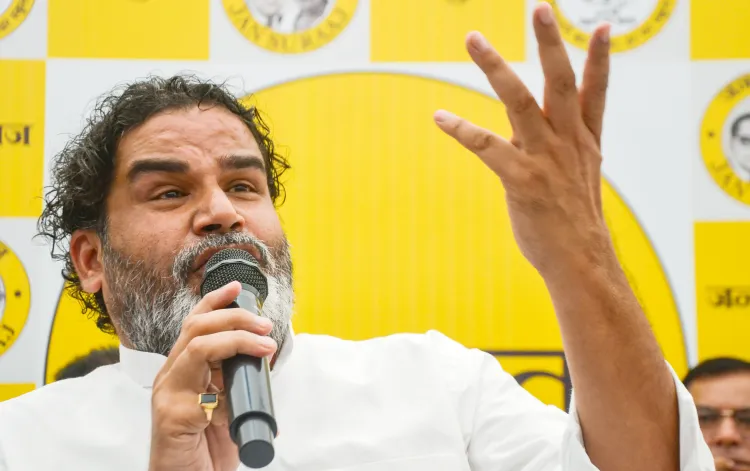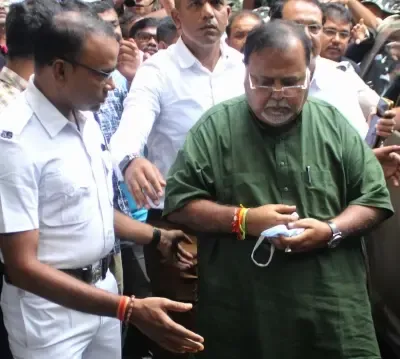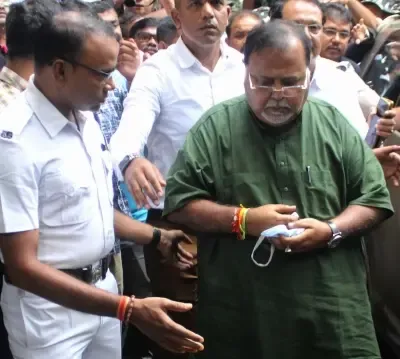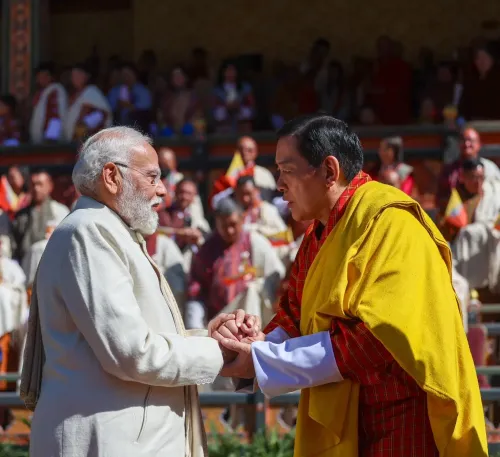Could Prashant Kishor’s Jan Suraaj Party Disrupt Bihar Elections?

Synopsis
Key Takeaways
- Prashant Kishor is entering Bihar politics with his Jan Suraaj Party.
- The party could potentially disrupt the traditional political landscape.
- Initial surveys indicate a possible voter base in south Bihar.
- Kishor is focused on caste dynamics to build his support.
- His outreach efforts have spanned thousands of villages.
New Delhi, Sep 25 (NationPress) The political landscape is keenly observing Prashant Kishor, a strategist turned politician, as he prepares to venture into the electoral arena with his Jan Suraaj Party (JSP) for the upcoming Bihar Assembly elections.
Kishor enters a political battleground traditionally dominated by two key factions.
In the recent electoral scenario, the Opposition alliance known as “Grand Alliance” or “Mahagathbandhan” (MGB) stands in direct competition against the ruling National Democratic Alliance (NDA).
A recent pre-election survey indicated a competitive race between these two entities. In the 2020 Assembly elections, the NDA narrowly defeated the MGB by just 0.03 percent in vote share, securing a slight edge with a dozen seats in the 243-member Assembly. Thus, should the JSP capture a small fraction of the vote from either side, it could potentially become a decisive force.
Current polling forecasts suggest that even a 5 percent influence from the JSP could alter the political dynamics significantly, raising the prospect of them becoming a “kingmaker” or even introducing a new “king”.
A fragmented anti-incumbency vote might favor the ruling coalition, or alternatively, enable the JSP to secure enough seats to assist the Opposition in a hung assembly.
Initial signs indicate that JSP has garnered some traction in south Bihar, but its ability to convert this support into actual votes remains uncertain.
According to a survey released this week, Patna holds 21 Assembly seats where the JSP seems to have a notable presence, with parts of Saran (24 Assembly seats) also showing a favorable inclination towards the party.
In various regions of Bhojpur (22 seats), there are indications of support for this new political player. Kishor, a skilled pollster, is also working on the intricate religion and caste dynamics in Bihar. The JSP is planning to field at least 40 Muslim candidates when it announces its complete roster for all 243 seats.
Nonetheless, Kishor faces some pushback from minority communities due to his previous role as a consultant for Narendra Modi during the 2012 Gujarat Assembly elections and the 2014 Lok Sabha polls.
As a member of a forward caste family, he must leverage his expertise to appeal to Dalits, Other Backward Classes, and Extremely Backward Classes, among others. Many forward caste voters are perceived as supporters of the Bharatiya Janata Party (BJP), a key component of the NDA.
Kishor is leaving no stone unturned in this initial foray into direct politics. He embarked on a “Jan Suraaj Yatra” to assess public sentiment beginning October 2, 2022, traversing over 5,500 villages in two years.
This past May, he launched a 120-day “Bihar Badlaav Yatra”. His outreach efforts continue both in person and through virtual platforms.
Previously, Kishor consulted established political parties with substantial resources, reportedly for “hundreds of crores”. His campaigns have generally been successful, with his slogan “chai pe charcha” achieving national recognition.
Kishor managed the operations of his organization, I-PAC, before deciding to enter politics directly. He briefly held a significant role in Janata Dal (United) under Nitish Kumar until disagreements over political strategies led to his exit.









